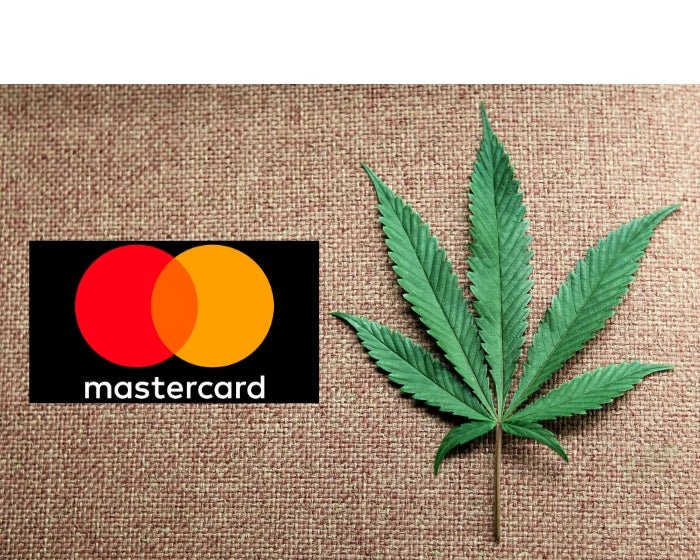The payment processing titan directed financial payment companies to end the practice of allowing U.S. customers to purchase legal marijuana items with its debit cards.

Buying recreational cannabis products just got much harder for Americans living in states with legal adult-use marijuana. As first reported by Bloomberg this past Wednesday, Mastercard, the world’s second-largest payment solutions provider, announced that it had instructed financial institutions and other payment processors to stop permitting marijuana purchase transactions with its debit cards.
Although cannabis is now legal, recreationally, medicinally, or both, in 40 states, it is still illegal at the federal level. As a result, banks that attempt to do business with marijuana companies face a litany of tight federal restrictions, which cause many of them to avoid altogether providing standard financial services, including setting up checking accounts and credit/debit card processing for those businesses.
Upon learning that some retail dispensaries had begun accepting payments with Mastercard debit cards, the company issued cease and desist letters to financial companies last week informing them of the drastic action.
In a statement, a spokesperson for Mastercard said, “As we were made aware of this matter, we quickly investigated it. In accordance with our policies, we instructed the financial institutions that offer payment services to cannabis merchants and connected them to Mastercard to terminate the activity. The federal government considers cannabis sales illegal, so these purchases are not allowed on our systems.”
"As we were made aware of this matter, we quickly investigated it. In accordance with our policies, we instructed the financial institutions that offer payment services to cannabis merchants and connected them to Mastercard to terminate the activity. The federal government considers cannabis sales illegal, so these purchases are not allowed on our systems.”
- Spokesperson for Mastercard
The shutdown of debit card transactions by Mastercard is another in a series of challenging blows to companies trying to conduct state-legal cannabis business during the ongoing federal prohibition against marijuana in the United States.
Last year, another popular system for payment at retail dispensaries known as cashless ATMs, which allow customers to use their debit cards to make cash withdrawals and then use that currency to buy marijuana products, was terminated by many of the largest processors of ATM transactions, such as NCR Corp.’s Columbus Data Services.
Because of these recent clampdowns on electronic payment options, legally licensed cannabis retailers have few alternatives left for conducting business with their customers, according to Tyler Beuerlein, chief strategic business development officer of Safe Harbor Financial Services, which provides banking and lending services to marijuana companies.
“More people have migrated to PIN debit in the last year and a half as the cashless ATMs have had issues. If the PIN debit solutions go away, it leaves people back with ACH or cash,” said Beuerlein.
"More people have migrated to PIN debit in the last year and a half as the cashless ATMs have had issues. If the PIN debit solutions go away, it leaves people back with ACH or cash.”
- Tyler Beuerlein, Chief Strategic Business Development Officer of Safe Harbor Financial Services
Similarly, Peter Su, who is the director of specialty banking at Hanover Bank and has led numerous cannabis banking programs along with working as a payment processing consultant for the industry, said he began taking calls from concerned retail owners last week, desperately searching for other payment solution options. He also noted that his company is being flooded with even more inquiries this week.
“My phones are ringing off the hook — people are asking for payment alternatives,” Su said.
Because of the federal ban and actions like the ones taken by Mastercard this week, retail dispensary owners face a complex and potentially dangerous future. Backed into a financial corner, many companies must operate on an almost exclusive cash basis, leaving them vulnerable. This reality has led to a massive spike in robberies, money laundering, and organized crime activity.
One solution drifting listlessly for the better part of a decade on Capitol Hill is the Secure and Fair Enforcement (SAFE) Banking Act or SAFE Act. First known as the Marijuana Businesses Access to Banking Act, the bill was introduced in the 113th Congress by former Rep. Ed Perlmutter (D-CO). Since that initial filing, the bill has gone from a relatively straightforward seven-page document to a much more sophisticated and nuanced 38 pages.
Regardless of length, the essence of the measure remains the same. Because of the federal ban on cannabis, banking, and financial processing organizations, like Mastercard, face the significant threat of having their deposit insurance discontinued or limited and potential criminal prosecution if they allow cannabis companies access to their financial services. The SAFE Act would protect financial institutions from prosecution for providing financial services to cannabis companies.
However, while the measure enjoys solid and committed bipartisan support in both chambers of Congress and has passed in the House of Representatives on seven separate occasions, it has yet to go to the Senate floor for a vote. Leaders in that body, most notably Sen. Chuck Schumer (D-NY), have promised to work relentlessly to get the bill approved in the Senate during this current session. However, if the past is any indication of future behavior, advocates and stakeholders from the cannabis industry are not very optimistic.
One of those sector leaders is Matt Darin, the CEO of Curaleaf, one of the world’s largest cannabis companies in revenue. In a recent interview via email with High Times, he expressed the industry’s growing impatience by writing, “Our industry is one of the fastest-growing sectors in the U.S., generating more than $3.7 billion in state tax revenue in 2022 and employing over 428,000 Americans. Furthermore, cannabis is legal for medical purposes in 40 states, for recreational purposes in 23 states, and an overwhelming 88% of Americans say that cannabis should be legalized across the country. When will the laws catch up?”
"Our industry is one of the fastest-growing sectors in the U.S., generating more than $3.7 billion in state tax revenue in 2022 and employing over 428,000 Americans. Furthermore, cannabis is legal for medical purposes in 40 states, for recreational purposes in 23 states, and an overwhelming 88% of Americans say that cannabis should be legalized across the country. When will the laws catch up?”
- Matt Darin, CEO of Curaleaf
His argument is compelling, and his frustration is more than understandable. By all estimates, the impact of marijuana will be one of the most critical drivers in the growth and expansion of the American economy over the next 5 to 15 years. It is already an industry too large and too important to fail. It’s time the supposed leaders in Washington get the memo and act accordingly and quickly.







































